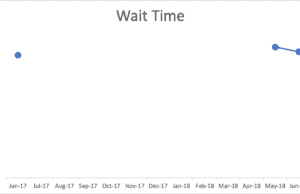Mark Graban
Lean Shouldn’t be a Reason for Nurses to Strike
A retired labor leader from the automotive industry (who reads this blog) sent me a link to this article:
#RedforMed: 1,800 Vermont Nurses Are On Strike Demanding Their Hospital Put Patients Over Profits
The article isn't from a newspaper; it's from a site that provides "independent and incisive coverage of the labor movement and the struggles of workers to obtain safe, healthy and just workplaces."
Again, for the record, I'm all in favor of "safety, healthy, and just workplaces." That's what Lean management aims to deliver.
Recorded Webinar: TWI and Kata: Skill Patterns to Develop a Culture...
Here is a recorded webinar...
I played host (along with KaiNexus) for this webinar that was held Tuesday, August 14 at 1 pm ET.
A Stomach Bug, the Emergency Room “Gemba,” and Charts, Charts, Charts
Here's a reprieve from posts about my new book Measures of Success: React Less, Lead Better, Improve More. Although I will mention that the book should be available very soon in the Apple iBooks store. And today's post is on themes from the book.
Unfortunately, I've had two trips to the emergency room within the past year, due to stomach flu problems. Or, it was possible food poisoning. In cases like these, the doctors aren't really worried about the exact root cause, because the treatment is the same either way. They're treating symptoms.
Last Wednesday morning, I woke up early and I was sick. Stomach issues. Fever. I noticed on my Fitbit that my heart rate was elevated above normal levels. I was working from home that day, so I stayed in bed, slept, and rested. I wasn't really able to eat anything and it was hard to get liquids down...
Podcast #313 – Audiobook Excerpt From “Measures of Success”
Today's episode (#313) of the podcast is a bit of a departure from the norm. Instead of interviewing a guest about their book or other work, I'm reading what's basically an audiobook-style excerpt of the first part of my new book Measures of Success: React Less, Lead Better, Improve More.
I say "audiobook-style" because it's not professionally produced and my voice has been bad after being sick last week... but I thought this would be one way to share some of this material and promote the book. I won't be doing a full-blown audiobook because the book is so full of charts, I don't think it all translates well to the audiobook format. But, here I'm reading the foreword, the preface, the introduction, and part of Chapter 1.
“Measures of Success” is Done! Now Available in the Amazon Kindle...
I'm happy to announce that my latest book, Measures of Success: React Less, Lead Better, Improve More, is completed!
That means I was able to release...
Jeff Hunter on Patient-Centered Strategy and Building Learning Systems in Healthcare
Joining me today for Episode #312 of the podcast is Jeff Hunter, author of the excellent book "Patient-Centered Strategy: A Learning System for Better Care."
Jeff was with the ThedaCare in Wisconsin, where he was Senior Vice President, Strategy and Marketing for the health system. After retiring from ThedaCare, he has been a faculty member for Catalysis and has started his own consulting firm, Jeff Hunter Strategy.
In today's podcast, we discuss a number of topics, including how a good strategy is a necessary input for a "strategy deployment" management process, some of the problems with traditional approaches to strategic planning, and why an iterative PDSA approach works better than static plans.
Telling Dentists or Patients What to Do or Evoking Reasons for...
In this post, I talk about my dental practices "need" to get Lean, my need to floss, and some of the tactics that help others change. You being right doesn't mean mean others will accept your Lean practices or your scolding about flossing nightly.
A Tale of Two Dental Visits: Frustrating and Ideal
If a practice aims for "ideal care," how can there be so much waste and waiting one day, followed by a perfect waste-free visit the next? What are your experiences with care and delays in clinic settings?
Jess Orr on Lean Leadership Lessons from Toyota, Employee Engagement, and...
My guest for Episode 311 is Jess Orr, a continuous improvement practitioner at WestRock, a large paper and packaging company, where she helps plants foster a culture of continuous improvement and employee engagement.
\Her experience includes working directly for Toyota Motor Manufacturing Kentucky. She is particularly passionate about sharing best practices across industries, which motivated her to found Yokoten Learning.
In today's episode, we talk about her path from Six Sigma Black Belt to a Lean-thinking engineer at Toyota. How did she progress from solving problems herself to developing others? We'll talk about a blog post that she wrote for this blog earlier this year, Lean and ROI, leadership and culture, and much more. What is it like working outside of Toyota again? I hope you enjoy the discussion.
Did This Intervention Reduce Blood Culture Contamination Rates?
Here is a chart from a team in San Antonio, where I teach a class on Lean for quality and patient safety twice a year. This team was basically using the “A3” improvement methodology to look at a problem that really impacted patients. My understanding is that a contaminated blood culture bottle leads to false positive results that indicate that a patient has a bloodstream infection when they really don't.
“ER wait times down, but only slightly” or ER wait times...
This article was sent by a friend and blog reader from Winnipeg the other day:
"ER wait times down, but only slightly"
Oh good, the waiting times are down. But what does "only slightly" mean? Have ER wait times gone down in a meaningful way? Or are they just comparing two data points? Is this "down" a matter a signal or is it just noise in the system?
These are the types of questions that can be answered by methods in my new book Measures of Success: React Less, Lead Better, Improve More.
Context and a “Process Behavior Chart” Instead of Two Data Points:...
I started my career in manufacturing, so that's just one reason I'm interested in the topics of offshoring (sending manufacturing work overseas) and what's now called "reshoring," or bringing jobs and factories back to the U.S.
Somebody at A.T. Kearney sent me a link to their recent report on reshoring, with the headline:
Reshoring in Reverse Again
US manufacturers are not exactly coming back in droves. In fact, the 2018 Reshoring Index shows that imports from traditional offshoring countries are at a record high.
When you learn to look at data and workplace metrics through the "Process Behavior Chart" methodology, you learn to be skeptical of text descriptions like "a record high." Does "a record high" mean that the data point is statistically meaningful? Not always.

















